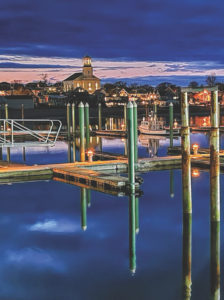PROVINCETOWN — The town’s Recovery Coalition is working on a phased reopening of Provincetown’s economy that depends on knowing how many people are here. That won’t be easy.
Board of health chair Steve Katsurinis describes a model that tries to balance the town’s population at any given time against its health care capacity and evolving indicators of viral spread. By allowing the population to increase, and then dialing it back down in case of an outbreak, town leaders hope to ensure that the number of infected people never exceeds the town’s health resources.
But controlling the population involves tools without much precedent, such as closing town parking lots or imposing restrictions on lodging. It also relies on knowing who’s actually here. And knowing the town’s real population at any given time has always been harder than it sounds.
“This is a transient town and the numbers change daily,” said Assistant Town Manager David Gardner. “There are no two days during the season that are alike.”
Provincetown is populated by people who live here all year; people who live here for a few months at a time; and people who travel back and forth between two or more homes. There are workers who drive or take the bus here every day, visitors who sleep in hotels and guest houses, and visitors who stay in short-term rentals. Finally, there are people who either live or stay further up Cape and drive to town just for the day. In a normal summer, there are also day-trippers arriving by tour bus, ferry, and cruise ship.

To make an occupancy plan, you’d want to know how many people are in each of those groups — not just today, but next week. Forecasting is always hard, but finding the upper limits of capacity is one way to start.
Hotels, motels, and guest houses are the most precisely counted, because they’ve been licensed by the town and taxed by the state for years. Provincetown Licensing Agent Linda Fiorella said there are 1,795 “commercial lodging units” in town — that’s mostly hotel rooms, but also some freestanding cottages and cabins, and 293 campsites. Fully occupied, those 1,795 units can hold 4,015 people, Fiorella said.
Provincetown also has 4,322 residential units, according to a 2018 UMass Dartmouth housing study. About 40 percent of them are occupied by year-round residents, the study said. Another 27 percent were listed for short-term rental on Airbnb, VRBO, or Homeaway, according to the data aggregator AirDNA.com. That 27 percent, or 1,148 units, had 2,327 bedrooms, for a total capacity of around 4,650 people in short-term rentals.
While AirDNA can generate a bedroom count of Provincetown’s listed properties, the Independent couldn’t generate a precise bedroom count for the rest of the town’s housing. A rough average of two bedrooms per unit, similar to what AirDNA showed for short-term rental properties, yields another 6,350 bedrooms.
Those bedrooms would account for the town’s year-round population, the second-home owners who don’t rent their homes short-term, and the town’s seasonal work force. Applying a maximum capacity of two persons per bedroom yields an estimate of 12,700 people.
Added together, the commercial lodgings, the short-term rentals, and the rest of the housing stock would total 10,000 rooms, and up to 21,000 people sleeping in those rooms. While none could confirm them precisely, these numbers seemed “pretty close” or “about right” to three members of the Recovery Coalition.
Parking and Day-trippers
The town controls 963 paid parking spaces, according to transportation coordinator Eric Sussman. There are also around 700 spaces in private parking lots, and another 500 or so for the customers of individual businesses. The bulk of the town’s parking is on residential streets, however, and those spaces aren’t numbered or counted.
There’s another way to estimate total parking spots, though. The number of parking stickers sold last year, to residents, property owners, and workers who drive in from other towns, was 3,594. The total number of parking spots in town is surely higher than that number.
Provincetown has already started to limit parking as a way to prevent overcrowding.
“The town is not open for business as usual,” said Town Manager Robin Craver on April 30. “Capacity in our lots may be reduced to accomplish the town’s social distancing goals. Our parking lots are limited for Provincetown permit holders and those accessing essential services only.”
For officials trying to manage the town’s day-to-day population, people driving here to park and wander could be a focus of attention. In the Recovery Coalition’s first report, Craver wrote, “The priority populations for the coalition are year-round residents, homeowners and part-time residents, long-term renters including workers who live in Provincetown, employees who work in Provincetown but live elsewhere, and guests of all homeowners.”
That’s a lot of people — but day-trippers are not on the list.



